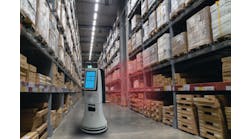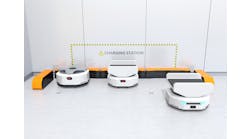By Michael Lev for MxD
In 2012, Amazon purchased robot-maker company Kiva Systems and locked in an advantage over other internet retailers by taking Kiva’s warehouse-automation technology for itself and dumping other Kiva customers.
Amazon’s decision set off a land rush among startups, who piled into the space to develop new high-tech sorting and conveyance systems for competitors. “That ‘robot arms race’ is continuing to this day, as companies struggle to keep up with Amazon’s ever faster pace of delivery,” Christopher Mims wrote in “Arriving Today,” his superb book about supply chains.
A good place to see the latest ideas for automating the work of warehouse and delivery operations was ProMat 2023, a manufacturing and supply chain trade show held recently in Chicago. Here are three companies that captured attention at ProMat:
Pickle Robot: The Boston-based company showed off a green and yellow mobile robot arm that unloads packages from truck trailers and ocean freight containers. “A worker stages the robot in front of container doors, and it autonomously moves forward into the container under its own power and direction as it picks up boxes, up to 60 pounds from the face and more weight if picked up from the top, and places them onto an attached conveyor that transports the loads out of the container,” Logosticsviewpoints.com reported. Unloading freight is physically demanding, unpleasant work. Pickle says its robot can unload 600+ boxes per hour.
Agility Robotics: Oregon-based Agility wins the creepy tech award for Digit, its humanoid machine that lifts and moves packages just like a human, without the complaining. Digit has arms, legs, and an oblong head with blinking LED eyes, and is designed to work alongside humans. “In the absence of a soul, eyes are the gateway to the face,” TechCrunch wrote about Digit. “In the case of a big, heavy robot with potentially limitless mobility, they offer insight (along with body language) about the system’s direction and intention.”
CoEvolution: Here’s a robot nightmare. Your warehouse operates five different autonomous mobile-robot systems, but they don’t coordinate properly and end up entangled like mechanical players in a game of Twister. An exaggeration, but CoEvolution, based in Hangzhou, China, showed off an integration system that manages all robot vendors working in a space in a single package. “As companies implement more robotic technology at their warehouse or factory site, they will find that they may want to integrate with more vendors, with different types of robots for their business needs,” a CoEvolution exec told FreightWaves. “So that’s when the multi-robot orchestration requirement comes up, and this way we can help.”
This piece first ran in Issue 32 of ChainMail.



